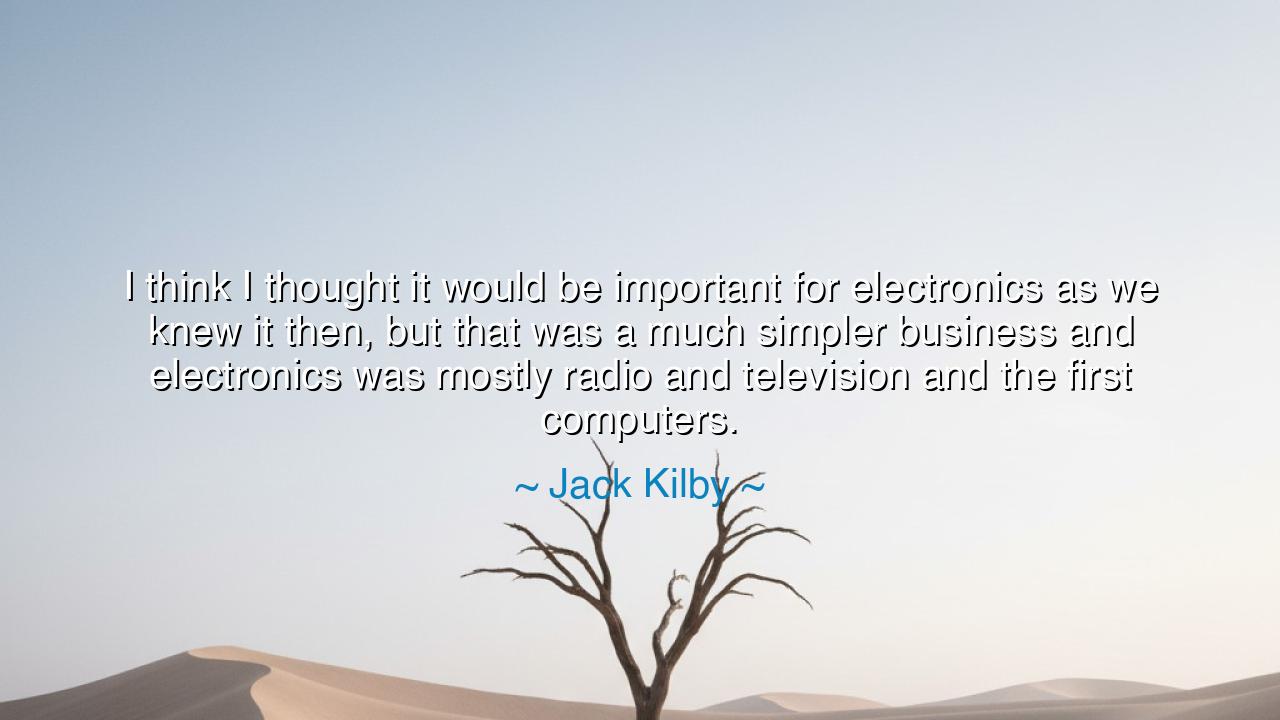
I think I thought it would be important for electronics as we
I think I thought it would be important for electronics as we knew it then, but that was a much simpler business and electronics was mostly radio and television and the first computers.






In the swirling river of human progress, there are moments when a single insight can spark a transformation, altering the course of history forever. Jack Kilby, in his reflection on the birth of electronics and technology, said, "I think I thought it would be important for electronics as we knew it then, but that was a much simpler business and electronics was mostly radio and television and the first computers." These words, spoken with a touch of humility and perhaps even surprise, speak to the monumental evolution of a field that, at its inception, seemed to be a modest affair—a collection of radios and simple machines that would later give birth to the digital revolution.
To understand the gravity of Kilby’s statement, one must look back at the beginnings of electronics, a realm that was once seen as a niche, almost mystical, art. The ancient Greeks, with their love for innovation and understanding, laid the foundations of what would become modern science. Archimedes, with his simple yet profound inventions, recognized that mechanical devices could harness the forces of nature to serve humanity. Yet, the leap from these early innovations to the birth of electronics—from radio waves to the first computers—was a journey of unimaginable scale. Just as Kilby reflects on how the world of electronics was once simple, the Greeks too would have been astonished by the rapid advancements that followed in their wake.
The story of electronics is, in many ways, a tale of humility. When Kilby and his peers were crafting the early transistor and the first integrated circuits, they were not imagining the digital behemoth we know today. Instead, their ambitions were modest, grounded in the belief that they were improving the existing systems of radio and television. This echoes the sentiment of Isaac Newton, who, in his groundbreaking work in physics, famously said that he stood "on the shoulders of giants." Newton, like Kilby, recognized that the foundation laid by others allowed for greater leaps in understanding. In the case of Kilby, those "giants" were the inventors of the radio and early computers, whose work paved the way for modern technology.
Consider the example of Thomas Edison, whose inventions in the late 19th century—particularly the electric light bulb—transformed the world. Like Kilby, Edison did not foresee the vast and complex network of electrical systems that would arise, nor the role that electricity would play in nearly every aspect of human life. Edison’s work, while revolutionary, was grounded in the practical application of electricity. He sought to light homes and build industries—he did not foresee the digital revolution that would follow. Kilby, in his own way, similarly laid the groundwork for a future that he could scarcely imagine, where electronics would not just power machines but would become the very framework for a new digital age.
The lesson to be learned from Kilby’s reflection is one of vision and humility. Often, the most profound contributions come not from grandiose plans for the future but from the willingness to improve upon the present. Kilby and his contemporaries worked within the confines of their time, believing their work would be important for a world of radios and television, yet they unintentionally set in motion a series of innovations that would lead to the birth of the information age. Similarly, the ancient Egyptians built the pyramids, not as monuments to the future, but as grand tributes to their gods. Yet, those very structures became symbols of human potential, inspiring future generations to reach for the stars. It is the quiet contribution to the world around us that often sets the stage for greatness.
Kilby’s words also remind us that the world of technology is built on progressive layers of improvement. Computers were once nothing more than large, cumbersome machines used by scientists and mathematicians. Today, they are the very foundation of modern life, embedded in every device from phones to cars, and shaping the future in ways that no one in the past could have imagined. This echoes the story of Leonardo da Vinci, who, though a genius in his own time, could not have foreseen the inventions that would be born from his sketches, such as the helicopter or the tank. His vision, like Kilby’s, was grounded in his own time, yet it shaped the world for centuries to come.
In our own lives, the lesson we must take from Kilby’s reflection is to recognize that our efforts, no matter how small they seem, are part of a larger tapestry of progress. Often, the changes we bring to the world are not immediately apparent, and the future is something we can only glimpse in part. We must not be discouraged by the limitations of our own vision, for what we do today may lay the foundation for future generations. In every pursuit, whether in technology, art, or philosophy, it is the simple steps forward that create the space for the monumental leaps to follow. Just as Kilby and his colleagues helped shape the future by working within the confines of their era, so too can we contribute to a future we may not fully understand. In humility and vision, we must each strive to leave behind a legacy of progress and possibility.






AAdministratorAdministrator
Welcome, honored guests. Please leave a comment, we will respond soon